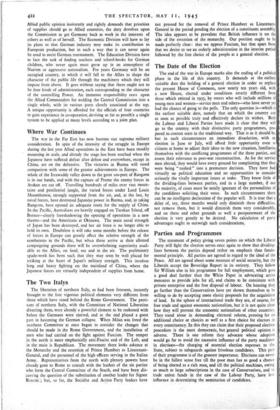Parties and Programmes
The statement of policy giving seven points on which the Liberal Party will fight the election serves once again to show that dividing- lines between the parties depend rather on emphasis than funda- mental principle. All parties are agreed in regard to the ideal of the Peace. All are agreed about some measure of social security, but the Liberals accept the Beveridge Report in its entirety. They follow Sir William also in his programme for full employment, which goes a good deal further than the White Paper in advocating active measures to provide jobs for all, and claims to be consistent with private enterprise and the free disposal of labour. On housing they go further than the Conservatives have yet shown themselves to be willing to do by accepting more elastic proposals for the acquisition of land. In the sphere of international trade they are, of course, for free trade and against eoonomic nationalism, but it is not quite clear how they will prevent the economic nationalism of other countries. They stand alone in demanding electoral reform, pressing for an additional choice or choices as well as a first choice for electors in every constituency. In this they can claim that their proposed election procedure is the most democratic, but general political opinion is adverse. There is one reform they advocate whose adoption would go far to avoid the excessive influence of the party machines in elections—the charging of essential election expenses to the State, subject to safeguards against frivolous candidates. This part
of their programme is of the greatest importance. Elections can never be in the fullest sense free till the poor man has as good a chance
of being elected as a rich man, and till the political machines, owing so much to large subscriptions in the case of Conservatives, and to trade union funds in the case of the Labour Party, have less influence in determining the nomination of candidates.






















 Previous page
Previous page